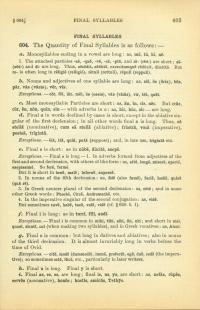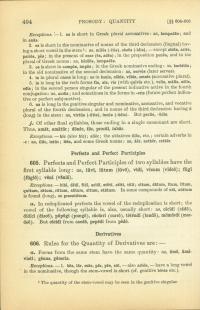604. The Quantity of Final Syllables is as follows.
a. Monosyllables ending in a vowel are long.
mē
tū
hī
nē
1. The attached particles -nĕ, -quĕ,-vĕ, -cĕ, -ptĕ, and rĕ- (rĕd-) are short; sē- (sēd-) and dī-are long.
sēcēdit
sēditiō
exercitumquĕ rĕdūcit
dīmittō
But re- is often long in rēligiō (relligiō), rētulī (rettulī), rēpulī (reppulī).
b. Nouns and adjectives of one syllable are long.
sōl
ōs (ōris)
bōs
pār
vās (vāsis)
vēr
vīs
Exceptions—
cŏr
fĕl
lăc
mĕl
ŏs (ossis)
văs (vădis)
vĭr
tŏt
quŏt
c. Most monosyllabic Particles are short.
ăn
ĭncĭs
nĕc
But crās, cūr, ēn, nōn, quīn, sīn with adverbs in c (hīc, hūc, sīc) are long.
d. Final a in words declined by cases is short, except in the Ablative singular of the 1st declension; in all other words final a is long.
eă stellă (Nominative), cum eā stellā (Ablative)
frūstrā
vocā (imperative)
posteā
trīgintā
Exceptions—
ēiă
ită
quiă
pută (suppose)
trīgintă, in late use, etc.
e. Final e is short.
nūbĕ
dūcitĕ
saepĕ
Exceptions—
Final e is long:
1. In adverbs formed from adjectives of the first and second declension, with others of like form.
altē
longē
miserē
apertē
saepissimē
(So ferē and fermē)
But it is short in benĕ, malĕ; īnfernĕ, supernĕ.
2. In nouns of the 5th declension.
fidē (also famē)
faciē
hodiē
quārē (quā rē)
3. In Greek neuters plural of the 2nd declension.
cētē
Phoebē
Circē
Andromachē, etc.
4. In the imperative singular of the 2nd conjugation.
vidē
However, sometimes it is short.
cavĕ
habĕ
tacĕ
valĕ
vidĕ (cf. § 629.b.1)
f. Final i is long.
turrī
fīlī
audī
Exceptions—
Final i is common in mihi, tibi, sibi, ibi, ubi; and short in nisĭ, quasĭ, sīcutĭ, cuĭ (when making two syllables), and in Greek Vocatives (Alexĭ).
g. Final o is common, but long in Datives and Ablatives; also in nouns of the 3rd declension. It is almost invariably long in verbs before the time of Ovid.
Exceptions—
citŏ
modŏ (dummodŏ)
immŏ
profectŏ
egŏ
duŏ
cedŏ (the imperative)
So sometimes octŏ, īlicŏ, etc., particularly in later writers.
h. Final u is long. Final y is short.
i. Final -as, -es, and -os, are long; final -is, -us, -ys, are short.
nefās
rūpēs
servōs (Accusative)
honōs
hostĭs
amīcŭs
Tethys
Exceptions—
1. -as is short in anăs and in Greek plural Accusatives.
lampadăs
2. -es is short in the Nominative of nouns of the 3rd declension (lingual) that have a short vowel in the stem.1
mīlĕs (-ĭtis)
obsĕs (-ĭdis)
Exceptions—
abiēs
ariēs
pariēs
pēs
the Present of esse (ĕs, adĕs)
the preposition penĕs
the plural of Greek nouns (hērōĕs, lampadĕs)
3. -os is short in compŏs, impŏs; in the Greek Nominative ending (barbitŏs) and the old Nominative of the 2nd declension (servŏs; later servus).
5. -is is long in plural cases.
bonīs
nōbīs
vōbīs
omnīs (Accusative plural)
5. -is is long in the verb forms fīs, sīs, vīs (with quīvīs etc.), velīs, mālīs, nōlīs, edīs; in the 2nd person singular Present indicative active in the 4th conjugation (audīs); and sometimes in the forms ending in -eris (Future Perfect indicative or Perfect subjunctive).
6. -us is long in the Genitive singular and Nominative, Accusative, and Vocative plural of the 4th declension, and in nouns of the 3rd declension having ū (long) in the stem.
virtūs (-ūtis)
incūs (-ūdis)
BUT,
pecŭs (-ŭdis)
j. Of other final syllables, those ending in a single consonant are short.
amăt, amātŭr
dōnĕc
făc
procŭl
iubăr
Exceptions—
hīc (also hĭc)
allēc
liēn
The Ablatives illōc, etc.
Certain adverbs in -c (illīc, istūc)
Some Greek nouns (āēr, aethēr, crātēr)


